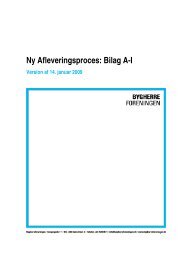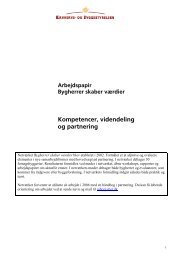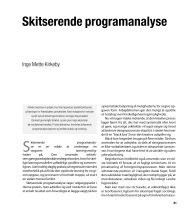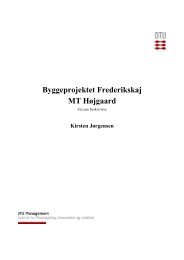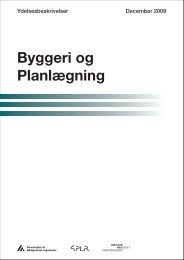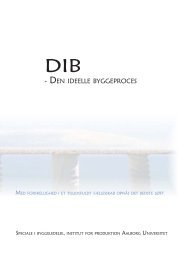Udvælgelses- dan og tildelingskriter ske byggesektor ... - RenProces
Udvælgelses- dan og tildelingskriter ske byggesektor ... - RenProces
Udvælgelses- dan og tildelingskriter ske byggesektor ... - RenProces
You also want an ePaper? Increase the reach of your titles
YUMPU automatically turns print PDFs into web optimized ePapers that Google loves.
team, they would prefer to use their experience and knowledge of the potential<br />
participants’ personal competencies instead of traditional tendering. But again, the<br />
respondents’ answers were built on intuitive feelings of how to choose the best team,<br />
and they do not seem capable of explicitly articulating on what criterion they would<br />
base the “ideal tendering process”.<br />
There are many reasons for problems with explicitly articulating causes among other<br />
things the competitive tradition in the industry seem to block alternative use of<br />
tendering. Furthermore, personal competencies is a fuzzy concept and very difficult to<br />
measure objectively. Expressed needs on soft personal competencies such as empathy<br />
can be understood in several ways and personal competencies also alter over time.<br />
Because of these obstacles the parties of the building industry have seldom set out<br />
specific wishes for an alternative way to set the project team.<br />
However, it is necessary to articulate the wishes for an alternative selection of team<br />
members in order to move in the direction of relying on more personal competencies<br />
and less on lowest prices. Firstly, criteria for the selection have to be explicit in order to<br />
make a competition legal (www.klfu.dk checked 23/4-07) and to avoid arbitration<br />
because of unclear awarding. Secondly, explicit criteria are necessary to allow the<br />
loosing team to improve, and thereby to ensure a healthy development of the bidding<br />
teams.<br />
Other experience and literature also emphasise the importance of personal relations (Ng<br />
et al., 2002), and personal competencies (Doyle, 2006) in building projects. (Interview<br />
with SAM karrierecenter 23/4-07). Furthermore, continuity of the core personal is<br />
perceived as important allow to the relationship between client and contractor to be<br />
reinforced at an individual level (Bresnen and Marshall, 2002).<br />
The above-mentioned findings showed that particularly the personal competencies of<br />
the project manager are important for the project success. Surprisingly, the literature on<br />
project success factors does not specifically mention competencies of the project<br />
manager as an important factor, which is in contrast to general management literature<br />
(Turner and Müller, 2005). Though, Turner and Müller strongly questions that this lack<br />
in the literature is due to the fact, that the project manager does not have impact on the<br />
project success. Instead they stress that there has not been much research with in the<br />
area.<br />
In summary, both the practitioners and the general management literature point to the<br />
(project) manager as a key person for success, and both the practitioner and the<br />
literature point to the personal soft competencies of the project manager as highly<br />
influential.<br />
6. ALTERNATIVE PROCEDURES FOR SELECTING THE<br />
PROJECT MANAGERS<br />
As stated above, personal competencies are very important for the success of building<br />
projects. So, for what can this information be used? In this section we turn to the case<br />
again to see, what the client might have done instead of focusing on the architect<br />
competition in order to support learning and development of the building process. It is<br />
not the objective to give the final answer just now. Instead we hope to inspire to more<br />
200



